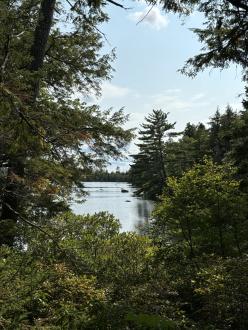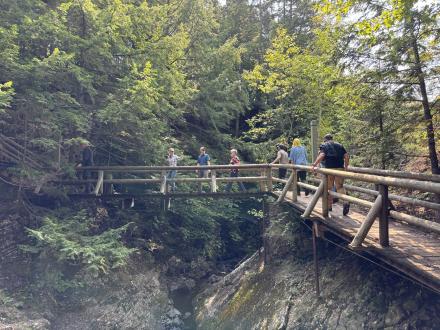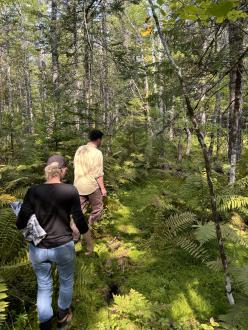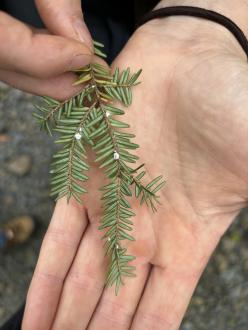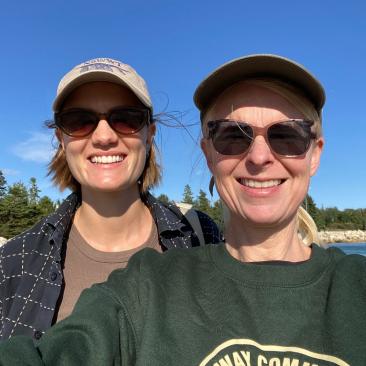
Vivian Peachey and Amy Willox from FSC Canada visited the Nova Scotia Landowners & Forest Fibre Producers organization who provides FSC forest management certification for private woodlot owners in Eastern Nova Scotia. They also met with representatives from other organizations in the Maritimes who are interested in becoming FSC certified.
As Vivian explained, "These community-based forest management models are really inspiring, and we're excited to explore how we can support their sustainability efforts."
Introducing New FSC Programs and Training
Vivian and Amy introduced the new FSC Climate and Landscape Solutions program, focusing on the work around Other Effective Conservation Measures (OECMs) within FSC certified forests, as well as carbon and fire management within the context of woodlots and community forests in the Maritimes. They delivered training on FSC Verified Impact, which Amy described as "a powerful and proven tool for quantifying the real-world environmental benefits of sustainable forestry practices."
The team explored how FSC’s verification process could support the goals of the organizations and group schemes to steward and restore the forests and woodlots they work with.
Exploring Ecosystem Service Impacts and Funding
They also delved into how verified ecosystem service impacts and associated claims can provide powerful evidence to support funding from sponsors. As Vivian noted, "Being able to quantify and verify the environmental benefits of these woodlots and community forests opens up new avenues for securing grants and investments."
The group was excited about the potential to receive financial support for forest management that helps to conserve biodiversity, carbon and other ecosystem services.
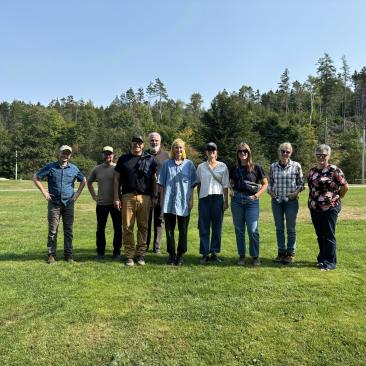
Forest Tours and Conservation
Vivian and Amy also toured forests in the Caledonia area with the team from Medway Community Forest Cooperative and Nova Scotia Working Woodland Trust, along with representatives from Environment and Climate Change Canada and Mersey Tobeatic Research Institute. They discussed how the woodlots and community forests can help Canada meet its conservation targets under the Global Biodiversity Framework.
Learning About Woodlot Easements and Stewardship
The team also learned about working woodlot easements on private woodlands for long-term stewardship through ecological forestry and conservation. When a land steward enters an agreement with the Nova Scotia Working Woodland Trust, they work together with regional woodlot service providers to develop FSC-certified stewardship plans to guide silviculture and land use practices.
Addressing the Hemlock Woolly Adelgid
Finally, the group visited a site as part of the Nova Scotia Working Woodland Trust's Hemlock Conservation program. They learned about the Hemlock Woolly Adelgid, an invasive pest that has been spreading across southwest Nova Scotia, causing hemlock defoliation and mortality in as little as 4 to 10 years. Working in collaboration with the province, community groups and organizations, the Trust conducts hemlock health assessments and has delivered targeted treatments.
Overall, the visit highlighted the innovative work these community-based forest management organizations are doing and the potential for verified ecosystem service impacts to support their sustainability and conservation efforts. As Vivian concluded, "These groups are true leaders in demonstrating how responsible forestry can deliver real environmental and economic benefits. We're committed to continuing to explore partnerships, like this one, and finding ways to amplify their important work."
If you are interested in supporting the work of these organizations in the Maritimes, please contact amy.willox@ca.fsc.org.
